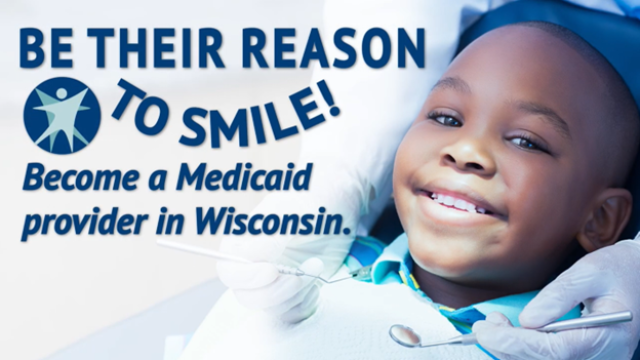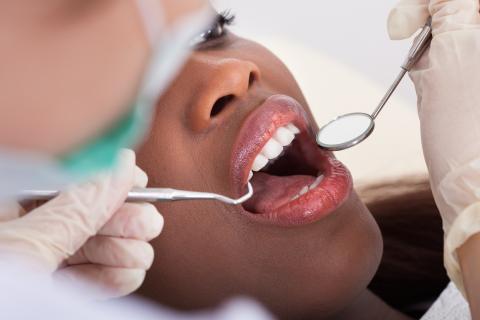Oral Health Program: Workforce
The Oral Health Program (OHP) is committed to supporting Wisconsin's oral health workforce for the benefit of all people of Wisconsin so that everyone is living their best life.
This is accomplished through policy development, technical assistance, needs assessment, training, education, and through the planning, implementation, and evaluation of preventive oral health programs. The majority of Wisconsin's oral health workforce is made up of dentists and dental hygienists.
Wisconsin Administrative Code for dental professionals
Visit State of Wisconsin Department of Safety and Professional Services (DSPS) – Dentistry, Dental Therapy, Dental Hygiene, and Expanded Function Dental Auxiliary for the Wisconsin Administrative Code on the practice of licensed dental professions.
Visit the Oral Health Program: Medicaid and BadgerCare Plus for Dental Providers webpage to learn about becoming a Wisconsin Medicaid and BadgerCare Plus provider.
Dental hygienists must be licensed
DSPS Dental Hygienist page explains the requirements and fees associated with obtaining or renewing your license in Wisconsin.
Practice settings, supervision, and limitations
- Traditional dental practice
- Dental hygienist is employed
- Dentist supervision
- Practice settings as defined in 2017 Wis. Admin. Code Act 20
- Dental hygienist can provide oral health care services
- In certain settings
- Without dentist oversight
- Can be hygienist-owned or mobile practice
- Increase care for underserved populations
- Special health care needs populations
- Rural communities
- Home bound or unable to travel
- Nursing homes
- Medical facilities
- Clinic or hospital, for example:
- Diabetic or cardiac patients
- Pregnant moms and pediatric patients
- Clinic or hospital, for example:
- Dental hygienist can perform
- Educational dental services
- Preventative dental services
- Therapeutic dental services
- Limitations as defined in Wis Stat.§ 447.01(3)(a-g)
- Dental hygienist can provide oral health care services
- Learn about the need for dental hygienists in Wisconsin's skilled nursing facilities, (PDF).
Professional organization support
The Wisconsin Dental Hygienists’ Association (WI-DHA) is the largest organization in the state dedicated to representing dental hygienists at the state and national level.
- WI-DHA is a constituent of the American Dental Hygienists’ Association (ADHA).
- WI-DHA and ADHA serve to help dental hygienists achieve their full potential as they seek to improve the public’s oral health.
Dental hygienist career opportunities
The Wisconsin Oral Health Program partnered with dental hygienists on a webinar series offering a glimpse into career opportunities available to licensed dental hygienists in Wisconsin. Each hygienist shares their unique story. You will know what inspires them, understand their passion for their work and the patients they serve, and learn helpful information for anyone interested in a career in similar practice settings.
- Dental Hygiene in Wisconsin, DHS: is the best place to start if you are exploring dental career options or have a dental hygiene license from another state and want to practice in Wisconsin. Learn about education, Wisconsin licensing, scope of practice, supervision, compensation and more.
- Dental Hygiene in Wisconsin: Local Health Department, DHS: provides an opportunity to understand public health hygienists and their varying roles. Public health hygienists may interact with patients in a school, senior center, or other community location. They help patients get dental care and may even learn expanded skills like teaching CPR, planning for emergencies, and responding to the community’s unique needs.
- Hygienists in Medical Dental Integration, DHS: reminds us that oral health is part of overall health. Not all patients see a dentist first. What happens when patients arrive for a medical visit with dental problems? Hygienists in medical settings often educate pregnant moms, see children during well child visits, and consult with urgent care doctors on dental-related concerns. Having a dental hygienist in the medical office can streamline care, help reduce emergency department visits related to tooth or mouth pain, and impact overall health outcomes.
- Oh, Get a Job, Already! What is dental hygiene?, DHS: Direct access dental hygienist, JenJen Reed, shares how mentors helped spark and encourage her dream career. As a first-generation Asian American she faced many barriers. By allowing her passion to lead, she became the first of her generation to start her own hygiene business serving medically compromised adults in Wisconsin nursing homes.
- Wi RDH: School-Based Setting, DHS: teaches the value of dental hygienists in school-based settings. Many children have trouble accessing dental care but, bringing dental services into schools can help. Since all programs differ, networking with others in your community is key to strengthening each one and helping more children. Learn tips for getting started, realistic timelines, and best practices. You will also learn to understand unique considerations for business ownership.
- Wisconsin Dental Hygienist in a Federally Qualified Healthcare Center DHS: offers insight into an amazing life and career journey as it overlaps to cross oceans, removes language and cultural barriers, and finds solid footing as part of a comprehensive team addressing a variety of healthcare needs for patients. Learn that opportunities for dental hygienists seem endless. They can work in a dental office, mobile dentistry program, be a language translator or even help a single mom receive life-saving cancer treatment. Sometimes, it is all part of an overlapping journey that fills one’s heart to overflowing.
- Expanded Practice Setting for Dental Hygienists Children's Health Alliance of Wisconsin (CHAW): Learn how dental hygienists can work in non-traditional settings to bring dental care to more locations and people statewide.
- Highlighting Medical Dental Integration CHAW: Learn about the innovative integration of dental hygienists into the primary care team at the Sixteenth Street Community Health Centers in Milwaukee.
Dentists must be registered
DSPS Dentist page explains the requirements and fees associated with obtaining or renewing your credential in Wisconsin.
Practice settings
Dentists can own, be employed, and volunteer services at:
- Dental office practices
- Educational institutions
- Government settings
- Health care settings
- Safety net clinics
Vaccine administration and limitations
- 2021 Wis. Admin. Code Act 8 says dentists are allowed to administer vaccines
- SARS-CoV-2 coronavirus
- Influenza
- Limitations as defined in Wis. Stat. § 447.059(1-4)
- Complete approved training
- Maintain additional liability insurance
- Adhere to vaccine specific requirements
- Record keeping
- Reporting
Professional organization support
The Wisconsin Dental Association (WDA) is the leading voice for dentistry in Wisconsin.
- WDA is affiliated with the American Dental Association (ADA).
- American Dental Association (ADA) is the largest and oldest national dental association in the world.
Visit the Medicaid and BadgerCare Plus for Dental Providers webpage to learn more about Medicaid enrollment, billing, trainings, and resources.
- Mobile Dentistry in Wisconsin, DHS training, .5 CE: At the conclusion of the webinar, participants will be able to define mobile dentistry per DE 10, identify who must register for a mobile license in Wisconsin and learn how to register, and understand the requirements and rules governing mobile dentistry in Wisconsin.
- Mobile Dentistry registration— requirements and application for a Wisconsin Mobile Dentistry Program registration.
Portable dental equipment
Watch demonstration videos on setting up and breaking down DNTLworks mobile dental equipment.
- Oral Health Program Information for Health Care Professionals, DHS: oral health-related resources on a variety of topic areas and sorted for health care professionals.
- Oral Health Program Information for All, DHS: oral health-related resources on a variety of topic areas and sorted for the general public. Share this page or print resources for patients.
Wisconsin professional license look-up and renewal
Visit DSPS to look-up Wisconsin professional license or renew professional license through LicensE.
Dental radiography
- X-Ray Facility Registrations, Surveys, and Inspections, DHS: explains annual registration of all x-ray devices, as required under Wis. Stat. §§ 254.31–254.45.
- X-Ray Regulatory Guide for Dental Facilities, P-01639, DHS publication: All registrants must have a radiation safety program and a written radiation safety policy. Sample radiation safety policy for dental facilities meets minimum standards under Wis. Admin. Code ch. DHS 157.
Department of Safety and Professional Services
- Dental Administration Code—Wis. Admin. Code on the practice of dentistry, dental hygiene, dental therapy, and expanded function dental auxiliary.
- Dental hygienist license—requirements and application for a Wisconsin Dental Hygienist license.
- Dentist license—requirements and application for a Wisconsin Dentist license.
- Dental therapist license — requirements and application for a Wisconsin Dental Therapist license.
- Expanded Function Dental Auxiliary—requirements and application for a Wisconsin Expanded Function Dental Auxiliary certificate.
- File a complaint—methods, process and alternatives to filing a complaint against a professional license.
- License renewal—take renewal survey and renew professional license through LicensE.
- Mobile dentistry—requirements and application for a Wisconsin Mobile Dentistry Program registration.
Not finding what you need? Reach out to the Oral Health Program.
Contact us and sign up for Oral Health Program updates



